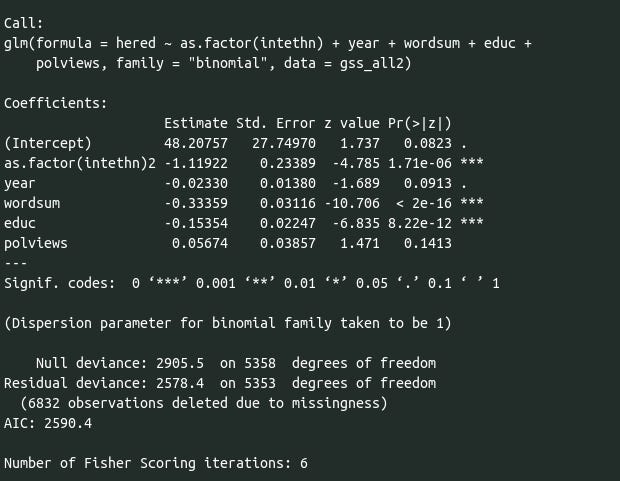How many people are hereditarians, really?
Black interviewers lead to less honest responses
I previously analyzed data from the GSS and ESS a while ago, and found that 5-10% of Americans thought that race differences in income/employment were due to innate differences in intelligence, and 15-20% of Europeans thought that race differences in intelligence were genetically caused. A common response I got was that these figures would be higher if people weren’t engaging in socially desirable responding. Which was a bit annoying, as I wrote that possibility down in my article.
So, there is another way to test that hypothesis: observe if the rate differs by type of interview. The GSS conducts both in-person and telephone interviews, which allow for this hypothesis to be tested. Year effects were adjusted for to avoid confounding with year, and the sample was subsetted to Whites.
Within the GSS, these would be the probabilities of responding “yes” when asked if they think that innate differences in intelligence contribute to differences in income/employment between Whites and Blacks for the year 2015:
In person interview: 7.5%
Phone interview: 5.4% (p = .008)
Web interview: 3.5% (p < .0001)
However, these associations disappeared after controlling for education, political views, and WORDSUM scores, meaning the result was a function of selection.
A different option is to test for the effect of the race of the interviewer. I subsetted to only White and Black interviewers to avoid the problem of dealing with other races, and to in-person only interviews. The expected probability to admitting to racial hereditarianism in the year 2015 would be:
White interviewer: 7.9%
Black interviewer: 4.1% (p = .00013)
I tried testing if the issue was selection again. In fact, the opposite was true: the difference between the conditions increased:
White interviewer: 6.1%
Black interviewer: 2.1% (p < .0001)
Regression for mode of interview:
Regression for mode with controls:
Regression for race of interviewer:
Regression for race of interviewer with controls:






My gut feeling says that HBD-style discussions were less socially acceptable in 2015 than what they are in 2024.
Five-to-ten percent of Americans being hereditarians, with the odds favoring it being on the lower side, is exceptionally believable, and any pretense to otherwise is a rightoid cope.
It's why I'm such a strong proponent of the Cofnas Solution. We are where we are because the continuous propaganda campaign since the Civil Rights Movement to bring us here was a success. Ideas don't approach lizardman-constant popularity numbers merely solely because of fear. The popular rerejection of hereditarianism has been genuine for genenerations now. Only an equally strong countercampaign can break the shell.